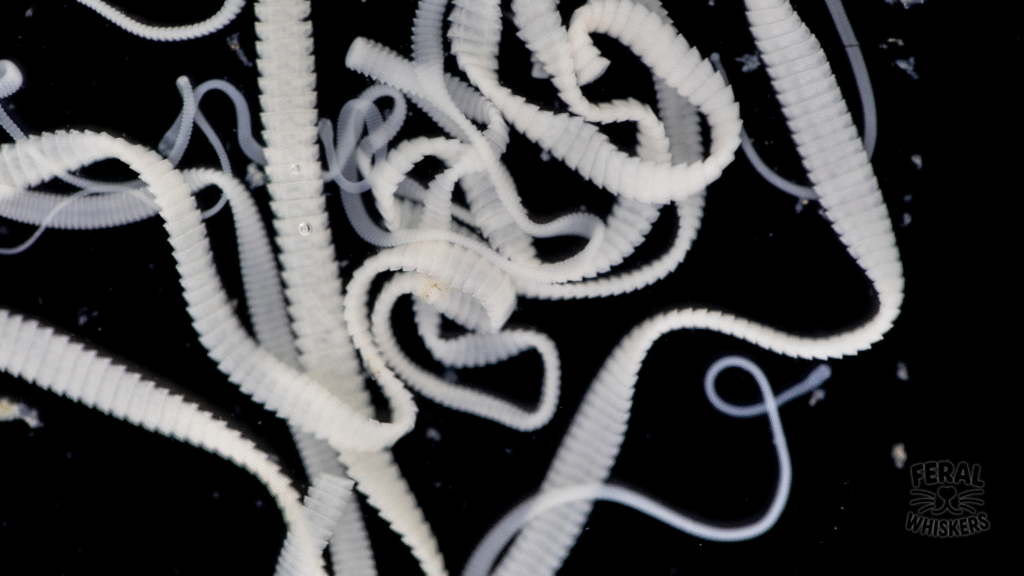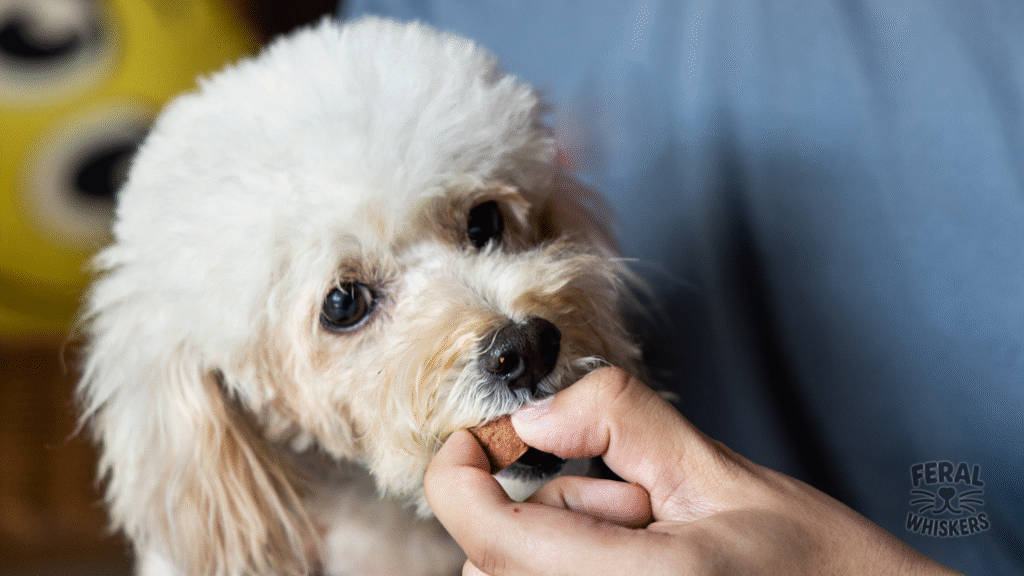📌 What Are Tapeworms?

Tapeworms are flat, segmented parasites that live in your dog’s intestines. Unlike roundworms (which look like spaghetti), tapeworms are made of many little segments, and each segment can break off and show up in your dog’s poop or around their bottom.
The most common type in dogs is Dipylidium caninum — and here’s the surprising part:
🐛 Dogs get these tapeworms from swallowing an infected flea while grooming.
Other tapeworms (Taenia, Echinococcus) come from eating raw meat or wildlife, like rabbits and rodents.
1. How Dogs Get Tapeworms
- Fleas 🪰: Flea larvae eat tapeworm eggs, and when your dog bites or licks a flea → worm infection.
- Wildlife/Raw meat 🍖: Dogs who scavenge, hunt, or eat raw organs can pick up other tapeworm species.
- Environment: Exposure to infected feces in contaminated yards or parks.
⚠️ Humans can also get certain tapeworms (rare but possible), usually by accidentally swallowing eggs from contaminated soil or poor hygiene after handling infected dogs.
2. Symptoms of Tapeworms in Dogs
Tapeworm infections are often mild compared to other worms, but they can still cause trouble, especially if untreated for long.
Common signs:
- Worm segments that look like grains of rice around the anus, on bedding, or in poop.
- Scooting on the floor (itchy bottom).
- Excessive licking/biting at the back end.
- Vomiting (sometimes whole tapeworms come up 🤢).
- Weight loss despite normal appetite.
- Dull coat, poor body condition (heavy cases).
Puppies with heavy infestations may suffer from stunted growth or digestive upset.
3. How Vets Diagnose Tapeworms
- Visual confirmation: Rice-like segments or chains of segments in stool.
- Fecal flotation test: Detects eggs under a microscope (but tapeworm eggs are heavier and sometimes missed).
- Owner observation: Most tapeworm cases are first spotted by fur parents seeing segments at home!
4. Vet Treatment: Safe & Highly Effective

The great news? Tapeworms are easy to treat compared to some other dog parasites.
4.1 Deworming Medications
- Praziquantel (Droncit®, Profender®): Kills all adult tapeworm species in dogs. Comes in pills, injections, or spot-ons.
- Combination products (Drontal®, Interceptor Plus®, Simparica Trio®): Many include praziquantel along with medicines for roundworms, hookworms, and sometimes fleas/ticks too.
👉 Usually just one dose is needed, but reinfection is common if fleas aren’t controlled.
4.2 Flea Control is Key
Since fleas are the main cause of Dipylidium tapeworms, your vet will also recommend year-round flea prevention.
5. Prevention: Stop Them Before They Start
- Year-round flea control 🪰 – regular flea preventives (chews or spot-ons).
- Deworming schedule – follow your vet’s preventive routine, especially for puppies.
- No raw meat/wildlife scavenging – avoid giving raw organs unless freeze-treated, and supervise dogs outdoors.
- Clean bedding/toys – wash weekly in hot water.
- Yard management – pick up poop daily, reduce exposure to stray animals.
6. Holistic & Budget-Friendly Prevention
Vet meds are super effective and safest for active tapeworm infection. But for fur parents wanting extra protection, gut support, or budget-friendly prevention, these help keep your pup’s gut strong and less welcoming to parasites:
6.1 Food Remedies
- Pumpkin Seeds 🎃 – Raw, ground pumpkin seeds have compounds (cucurbitacin) that paralyze tapeworms.
- Dose: ~1 tsp per 10 lbs food daily.
- Grated Carrots 🥕 – Fiber helps “sweep” worms from intestines.
- Coconut Oil 🥥 – Natural antimicrobial; start with 1 tsp per 10 lbs daily.
- Garlic (tiny doses only) – May help repel internal parasites. Add ¼ clove for small dogs, 1 clove for large (with caution).
6.2 Herbal Aids (Vet/Holistic Guidance Recommended)
- Food-Grade Diatomaceous Earth (DE): Added in tiny amounts to food; believed to dehydrate parasites.
- Wormwood, Black Walnut, Cloves: Strong traditional anti-parasitics. ⚠️ Use ONLY with holistic vet guidance, as overdoses can be toxic.
6.3 Natural Flea Prevention (for Tapeworm Control)
- ACV Spray: Mix 1 cup apple cider vinegar + 1 cup water + few drops cedar or lavender oil → daily coat mist before walks.
- Coconut Oil Rubs: Lightly coat fur to make flea attachment harder.
- Clean Environment: Sprinkle food-grade DE in bedding/carpets; vacuum daily.
7. Step-by-Step Plan for Fur Parents
If Your Dog Has Tapeworms
- 🩺 Vet visit → praziquantel treatment.
- 🛁 Bathe dog after treatment to remove flea eggs.
- 🧼 Wash bedding in hot water.
- 🪰 Begin/refresh flea prevention immediately.
- 🥛 Add probiotics + pumpkin to soothe gut during recovery.
If You Can’t Afford a Vet Immediately
- 🚫 Stop flea cycle: bathe + use natural flea sprays daily.
- 🥥 Add pumpkin seeds & coconut oil to food for support.
- 🧹 Vacuum & wash bedding constantly.
- ❗ But remember: these only help reduce burden — you’ll still need vet meds eventually for full cure.
8. FAQs
Q1: I saw rice-like grains on my dog’s butt — is it definitely tapeworms?
👉 Most likely yes, especially if you also see fleas. Bring a sample to your vet for confirmation.
Q2: Can people get tapeworms from dogs?
👉 Rare, but possible if swallow eggs or infected fleas (mostly young kids). Hygiene + flea control keeps risk low.
Q3: Can I cure tapeworms with pumpkin seeds alone?
👉 No. They help support but don’t fully kill parasites like praziquantel does.
Q4: Can my indoor-only dog get tapeworms?
👉 Yes. Fleas can hitchhike indoors. Indoor dogs still need flea/tapeworm prevention.
Q5: How often should I deworm against tapeworms?
👉 Adults: year-round parasite preventives. Puppies: deworm every 2 weeks until 3 months, then monthly until 6 months.
9. Common Fur Parent Concerns
| Concern | Simple Answer |
|---|---|
| “My dog keeps getting tapeworms again!” | Flea problem still present. Must eliminate fleas indoors + outdoors. |
| “I never see worms in stool — so my dog is fine, right?” | False. Worms may shed only occasionally. Regular vet checks + preventives are essential. |
| “Dewormers are too expensive.” | Praziquantel generics are often affordable. Flea prevention is long-term cheaper than repeated treatments. |
| “Tapeworms aren’t dangerous, so I don’t need to worry.” | Heavy infections can cause weight loss + gut irritation. Plus, zoonotic risk to kids. |
✅ Final Takeaway
Tapeworms may not be the deadliest dog parasite, but they’re one of the most preventable. Since fleas are the main culprit, year-round flea control is the BEST way to keep tapeworms away.
👉 Vet meds like praziquantel cure active infections quickly.
👉 Natural supports like pumpkin seeds, probiotics, and flea sprays keep your pup’s gut strong and reduce reinfection risk.
👉 Clean home + no fleas = no tapeworms!
🐾 With a balanced approach of vet prevention + holistic supports, you’ll keep your dog parasite-free, healthy, and comfy.

